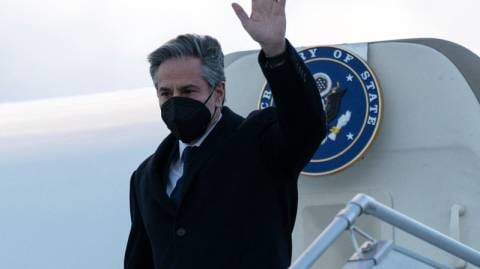
By Simon Lewis
BERLIN (Reuters) - U.S. Secretary of State Antony Blinken arrived in Berlin for talks with allies on Thursday in a diplomatic push to defuse tensions with Moscow over Ukraine, a day after warning that Russia could attack its neighbour at "very short notice".
U.S. President Joe Biden predicted on Wednesday that Russian President Vladimir Putin will make a military move into Ukraine after massing troops near its borders, but said a full-scale invasion would trigger a response that would be costly for Russia and its economy.
Blinken, who vowed in Kyiv on Wednesday that Washington would pursue diplomacy as long as it could, will hold talks with Germany, France and Britain before going to Geneva to meet Russian Foreign Minister Sergei Lavrov on Friday.
He will also give a speech in Berlin intended to put into context the tensions in Europe and the stakes involved, a senior State Department official said.
Aimed at the European public as well as policymakers, the speech will try to cast the crisis over Ukraine as a critical moment for the rules-based international order, the official said.
Blinken, the top U.S. diplomat, will say Russia's actions raise the question of where Moscow's efforts to rebuild the Soviet empire will stop, but that Washington still believes a diplomatic solution is possible.
U.S.-Russia negotiations last week produced no breakthrough.
Germany signalled on Tuesday that it could halt the Nord Stream 2 pipeline from Russia if Moscow invades Ukraine.
Blinken said on Wednesday the Russian build-up of tens of thousands of troops was taking place with "no provocation, no reason".
The Kremlin said tension around Ukraine was increasing and it was still waiting for a written U.S. response to its sweeping demands for security guarantees from the West.
Wednesday's pessimistic statements highlighted the gulf between Washington and Moscow before the talks between Blinken and Lavrov on Friday that a Russian foreign policy analyst called "probably the last stop before the train wreck".
Russia has also moved troops to Belarus for what it calls joint military exercises, giving it the option of attacking neighbouring Ukraine from the north, east and south.
Eight years ago it seized Crimea and backed separatist forces who took control of large parts of eastern Ukraine, but it has consistently denied any intention of invading now.
Russia says it feels menaced by Kyiv's growing ties with the West. It wants to prevent Ukraine ever joining NATO and for the alliance to pull back troops and weapons from eastern Europe.
(Reporting by Simon Lewis, Writing by Paul Carrel, Editing by Timothy Heritage)